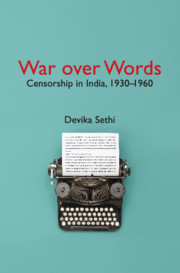Book contents
- Frontmatter
- Dedication
- Contents
- Acknowledgements
- List of Abbreviations
- Introduction
- Part I Guarding the State, Protecting the Public: Censorship Policies and Practices in the 1930s
- Part II Protests and Publicity: Banning Non-Indian Authors
- Part III Political or Military? Censorship in India during the Second World War
- 5 Blue Pencils, Red Pencils: Censoring the News in Wartime
- 6 A Contradiction in Terms? ‘Voluntary Censorship’
- Part IV The Censored Turn Censors: Freedom and Free Speech
- Conclusion
- Epilogue
- Bibliography
- Name Index
- General Index
6 - A Contradiction in Terms? ‘Voluntary Censorship’
from Part III - Political or Military? Censorship in India during the Second World War
Published online by Cambridge University Press: 26 April 2019
- Frontmatter
- Dedication
- Contents
- Acknowledgements
- List of Abbreviations
- Introduction
- Part I Guarding the State, Protecting the Public: Censorship Policies and Practices in the 1930s
- Part II Protests and Publicity: Banning Non-Indian Authors
- Part III Political or Military? Censorship in India during the Second World War
- 5 Blue Pencils, Red Pencils: Censoring the News in Wartime
- 6 A Contradiction in Terms? ‘Voluntary Censorship’
- Part IV The Censored Turn Censors: Freedom and Free Speech
- Conclusion
- Epilogue
- Bibliography
- Name Index
- General Index
Summary
In 1940 and again in 1942, the organized press in India and the GOI arrived at two ‘gentleman's agreements’ with each other. According to the terms of the Delhi Agreement of 1940, the Indian press committed not to impede the war effort. In October 1942, with Japan at the border of India, the Bombay Agreement went further and committed the press to holding back any information that would benefit the enemy or incite readers to subversion. This chapter explores the operation of these agreements, the problems arising during their implementation, and the enduring imprint they left on press–government relations in India after the war, and even after Independence.
In November 1940, the GOI passed an order under the DIR, banning publication of ‘matter calculated directly or indirectly to foment opposition to the successful prosecution of the war’ and providing for pre-censorship of material intended for publication. The order caused consternation among journalists, and one editor publicly stated that the measures would reduce editors to the position of ‘an inanimate automaton’. However, after discussions with and assurances from representatives of leading newspapers, the order was withdrawn, and the matter was left to the discretion of editors, who were to act in consultation with PAs to ensure that nothing was printed that impeded India's war effort. Representatives of the Indian and Eastern Newspapers Society (including Devdas Gandhi, the son of Mahatma Gandhi, and B. Shiva Rao) suggested to the GOI that small advisory committees be set up in Delhi and other provinces consisting of representatives of the press, which would then assist the CPA on matters relating to the press.
The essence of the ‘Press Advisory’ system was this: newspapers would, at their editors’ discretion, refer statements or reports to the PA for advice. In case the provincial government or the GOI took exception to publication, the matter would be referred (except in cases of grave emergency) to the Central or Provincial PAC, which would then decide on the matter of publication. The idea was that powers of suspension, suppression, and pre-censorship that were given to the GOI under the DIR would still remain, but that they would not be exercised on a knee-jerk basis, and not used without justification and consultation. To be ‘press-advised’ is a term commonly used in newspaper reports of the time.
- Type
- Chapter
- Information
- War over Words , pp. 146 - 172Publisher: Cambridge University PressPrint publication year: 2019

